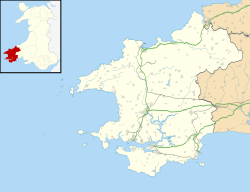| Upton Chapel | |
|---|---|
 | |
| 51°42′22″N4°51′59″W / 51.7060°N 4.8663°W | |
| Country | Wales |
| History | |
| Dedication | St Giles |
| Architecture | |
| Heritage designation | Grade I |
| Architectural type | Church |
Upton Chapel, close by Upton Castle, near Cosheston, Pembrokeshire, Wales, is dedicated to Saint Giles and is a Grade I listed building. Dating from the 12th or 13th century, it consists of a small nave and chancel. Amongst the memorials in the chapel are the effigies of William Malefant (died in 1362) wearing chain mail and another of a female member of the Malefant family. There are several memorials to local families. There is a small piscina and a Jacobean pulpit. The masonry walls are from local rubble stone. The roofs are slated with tile ridges and there is a bellcote at the west end. The interior was restored in 1978 by the owner of the castle. [1] [2] [3]
